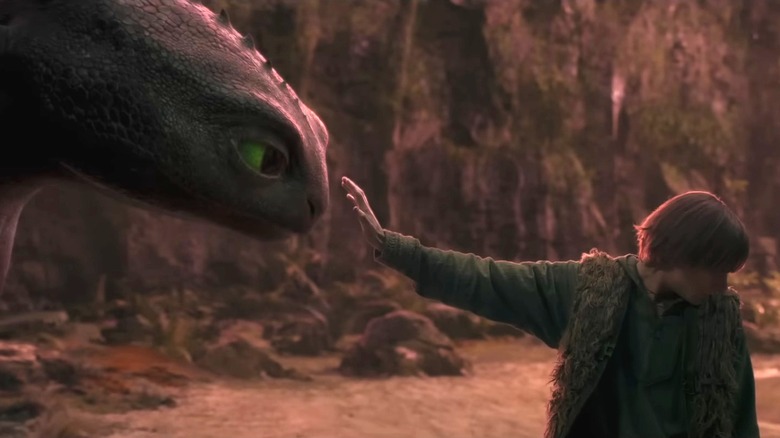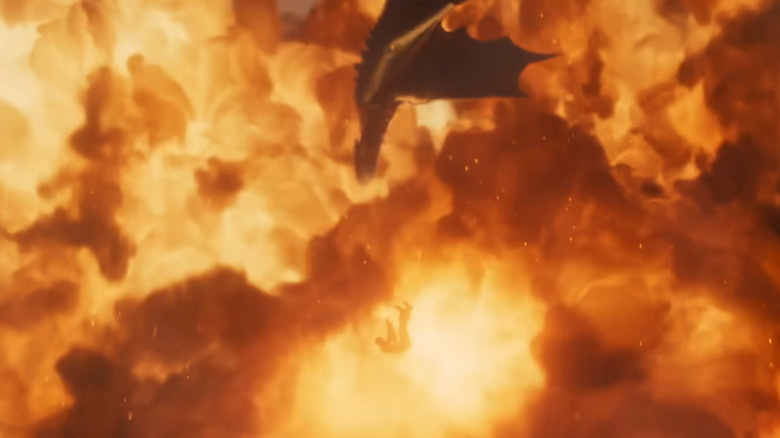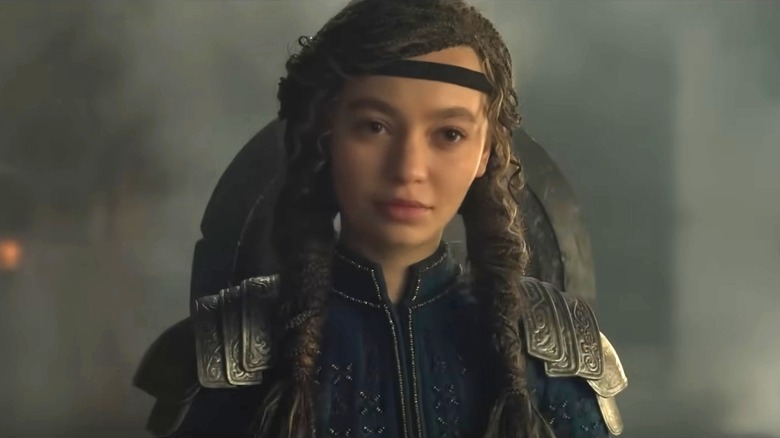The How To Train Your Dragon Remake Completely Fails For One Key Reason
This article contains spoilers for "How to Train Your Dragon."
Remakes tend to be a touchy subject. The very idea of someone tinkering with a beloved film causes some folks to immediately reach for their pitchforks. On one hand, their announcements can feel especially discouraging in a landscape where most movies emerging out of the studio system are in some way tied to an intellectual property. But at the same time, remakes can often present an opportunity to imbue a fresh, new perspective on a familiar tale. Good stories deserve to be retold because adaptations can lead to visual and/or thematic shifts that engage with the original text in interesting ways.
When we discuss the best remakes, these are often the ones that come up as beacons of this time-honored cinematic practice. They don't negate the existence of the originals, nor do they replace them, even if you don't care for the updates. Over the past few decades, Disney has cultivated an entire strategy dedicated to seemingly remaking their animated library into live-action films (or, as the "Spaceballs 2" trailer refers to Jon Favreau's "The Lion King," a "live action animated Lion King"). Kenneth Branagh's "Cinderella" and David Lowery's "Pete's Dragon" are considerable standouts from their predecessors because their translations of the originals veer off in new directions that give them a sense of identity. Most of these remakes, however, tend to follow the same beat-for-beat playbook with superficial deviations, and often an uglier visual palette to present them on.
The live-action Disney remakes aren't going to stop anytime soon because, while some flounder at the box office, most of them make a considerable profit. Despite the money, they don't leave much of a cultural imprint. It's difficult to place the blame solely on parents because the diversity of theatrically released family entertainment is at an all-time low. These remakes are largely soulless recreations that are embarrassingly beholden to their animated counterparts. When it was announced that Dreamworks and Universal Pictures would be following suit with a remake of the Academy Award-nominated "How to Train Your Dragon," I initially felt a pit in my stomach at the thought of another wave of these movies.
What caught my attention, however, was that Dean DeBlois, co-director of the 2010 film along with Chris Sanders, would be returning to the world of Berk for the first time since capping off the original animated trilogy ("How to Train Your Dragon: The Hidden World"). I maintained some optimism that the man responsible for some of the best animated features for Dreamworks and Disney ("Lilo & Stitch") would have a great idea to make such an ingrained family classic soar for a whole new generation. Plenty of filmmakers have revisited their own material, after all.
Within the first ten minutes of DeBlois' "How to Train Your Dragon" redux, I started to get worried this was solely going to be a slavish recreation of the 2010 film, and by the end, my concerns were not unfounded.
The How to Train Your Dragon remake has no discernible identity of its own
In "How to Train Your Dragon," a teenage Viking named Hiccup (Mason Thames) is considered an outcast among his community of dragon hunters. He desperately wants to fit in and impress his father/village chief Stoick the Vast (Gerard Butler) by nabbing a winged beast of his own. Hiccup ends up shooting down a rare Night Fury, but can't bring himself to kill the injured creature when the opportunity presents itself. He quickly learns, however, that there's more to dragons than what he's been told and forms an unbreakable bond with the one he names Toothless. The pair seek to end Berk's generational war, showing that dragons and Vikings can indeed co-exist.
If repeating the film's plot sounds redundant, imagine how it must feel to sit with DeBlois' superfluous remake, which has no other goal than shamelessly recreating the animated feature. I believe every film should be discussed on its own merits, but the issue with "How to Train Your Dragon" (2025) is that it has no discernible identity outside of its predecessor. I don't understand DeBlois' line of thinking in returning to this story, only to make almost the exact same film.
It would be easy to make comparison points with Gus Van Sant's 1998 near shot-for-shot remake of "Psycho," but that film is at least in conversation with Alfred Hitchcock's 1960 shocker and how those images translate over three decades later. There's a genuine experimentation angle on display that's virtually absent here. "How to Train Your Dragon" (2025) can't be in conversation with its animated predecessor because its changes are slight to the point that they don't offer any semblance of a new perspective. It's all window dressing.
The Cressida Cowell book series, of which the 2010 film was adapted from, is ripe with new material and alternate perspectives of these characters, but this movie has no interest in exploring anything that deviates from what came before. DeBlois goes so far out of his way to not step on any toes by retaining the same story, jokes, shot compositions, score, costumes, character designs, and emotional beats, all packaged exactly as you remember them with no introspection. There's an irony to keeping the moment where Hiccup tosses his cheat sheet that shows him to fly Toothless, when the film so tightly grasps onto its own. Fans of the original film will walk out of an elongated carbon copy of a movie they've already seen, which gets at an even bigger issue.
The How to Train Your Dragon remake sets a bad precedent regarding fan culture
Some of the best remakes are the result of a filmmaker wanting to put their own spin on a classic story, but "How to Train Your Dragon" (2025) is the kind of studio-mandated project whose only perspective is regurgitation. The appeal of seeing this story told in live-action is muddled when a good chunk of the new film is largely presented using CG animation anyway. The legendary Roger Deakins was brought on as a visual consultant for the 2010 film to sell the weight and scale that extends beyond the typical physics of animation, which defeats the purpose of bringing in cinematographer Bill Pope to make it feel even more tangible, despite featuring a bunch of animation of its own. It can't help but come across as a dig toward the medium being able to convey grounded and emotional storytelling because it's not technically real.
The only passion present in "How to Train Your Dragon" (2025) is in figuring out a way to give audiences what they expect, and I think that builds upon a dangerous precedent that we've seen play out across countless franchises over the past decade or so. What does being respectful to the source material even mean if this is the barometer we hold that standard to?
If you spend enough time on the internet, you'll bear witness to the most unimaginative dwellers getting up in arms at change, something they tend to be dubious of. Nico Parker, who plays Astrid, was subject to a vitriolic harassment campaign that she didn't deserve because she wasn't a 1-1 match of the blonde Viking warrior voiced by America Ferrara (via Deadline). It's arguably one of the film's biggest visual changes, and a section of the fandom did what they do to just about every minority actor joining a beloved franchise.
Movies, especially retellings, should change and should evolve, but "How to Train Your Dragon" (2025) feels creatively stunted. There's nothing I find more boring than a film that coddles its fans with weaponized nostalgia. The sequence where Hiccup takes off on Toothless for the first time features the same musical cues from composer John Powell's sweeping 2010 score. It sounds fine, sure, but are the emotions coming from the scene impacting the audience on its own accord, or because they already come prepackaged? The absence of risk is all so incredibly cynical and disingenuous.
The cultural nadir is lapping up regurgitated leftovers and saying it was good enough because you were sold an inferior version of the same meal from 15 years ago. I can't think of a more wasteful use of resources. Somewhere along the way, franchise filmmakers lost the plot of making movies, not fan films. It wouldn't be so frustrating if these kinds of movies weren't primed to be $1 billion hits in the making.
We already know a live-action remake of "How to Train Your Dragon 2" is slated for summer 2027 and I, for one, eagerly anticipate seeing how they generate surprise and excitement for a movie you can watch for free on Peacock right now.
"How to Train Your Dragon" is currently playing in theaters nationwide.


